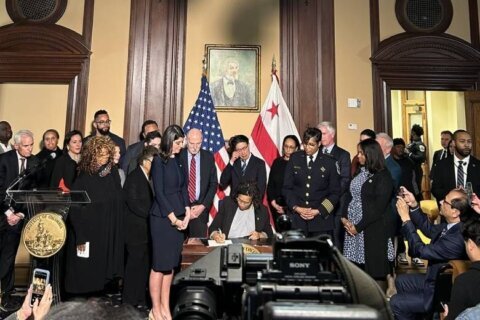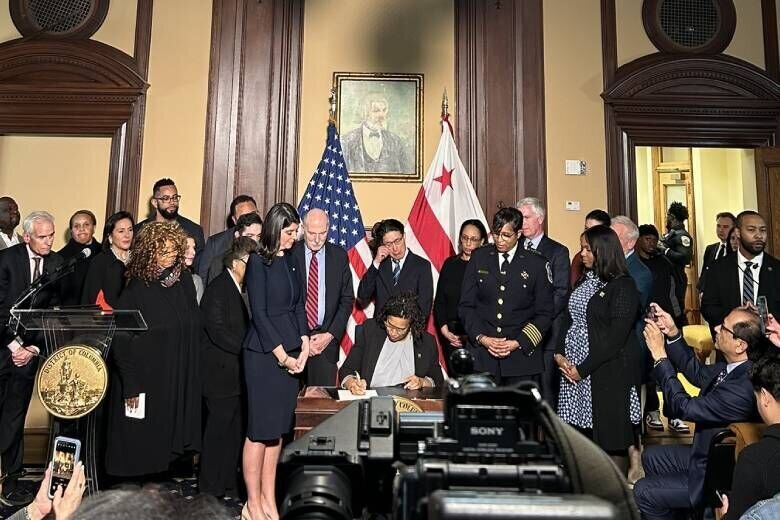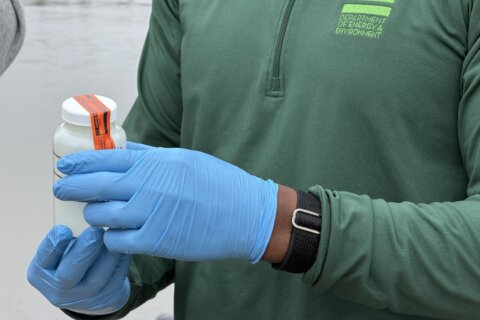
Touting already improving crime trends, D.C. Mayor Muriel Bowser signed a sweeping anti-crime bill Monday, signaling a crackdown on violent crime that plagued the city last year.
The package, called Secure D.C., was unanimously approved by the Council last week, with Council member Trayon White voting “present.” The legislation spans various topics, ranging from retail theft to drug-free zones, among others.
Before signing the package into law, Bowser said she had just received a D.C. police briefing that highlighted promising results. For the first two and a half months of this year, Bowser said, homicides are down 33%, violent crime is down 14%, property crime is down 12% and overall crime is down 13%.
But those promising trends contrast with community anxieties, resulting in residents lobbying lawmakers to do more to combat carjackings, theft and other crimes. The Secure D.C. legislation, Bowser said, should address some of those concerns, pointing out that the only people who should be concerned with the measure are the ones committing crimes.
Critics, however, say the legislation gives police too much unchecked power.
“We want the message to be very clear: If you are participating in those activities, we will hold you accountable,” Bowser said. “Our community has sent a very clear message. People are tired of crime and violence, and they want to count on accountability.”
The legislation makes it easier for judges to keep juveniles and adults accused of violent crimes detained while they’re waiting for their trials. It expands the definition of carjacking to help with the prosecution of those cases, and it creates new gun offenses “to address the unacceptable level of gun violence and illegal firearms flooding into our city,” Ward 2 Council member Brooke Pinto said.
The package also addresses retail theft, and allows for DNA collection once someone is charged with a violent crime and has a probable cause hearing. It also includes the launch of a blue-light program, so that anyone waiting at a bus stop can easily contact emergency officials. And, it establishes a pre-arrest diversion task force to connect people with services they may need.
The legislation came together after months of neighborhood walks, public hearings and community events, Pinto said.
“No matter what neighborhood you live in the District, you deserve to be safe,” Pinto said. “The government should and will support your safety and your well-being.”
The legislation allows D.C. police to engage in chases under certain circumstances, and enables the department to establish drug-free zones in hot spots.
The agency, Bowser said, has been analyzing data for weeks, and she expects Police Chief Pamela Smith to “make some decisions based on that data of where to deploy that tool immediately.”
Council Chairman Phil Mendelson, who said before last week’s vote that promotion of the legislation had misled the public to believe the solution to the city’s crime challenges is the council’s work, said “citizens have a right to feel safe in the city, and citizens also have a right to feel that their government is listening to them and being responsive.”
Bowser, meanwhile, called the package a step toward helping city leaders “rebalance that public safety ecosystem that has changed over the last 10 years.”
However, critics of the measures argue they give too much power to police with little accountability. Organizations such as the ACLU of DC voiced their opposition. Matthew Graves, the U.S. Attorney for D.C., has supported the legislation.
“If you’re making our city less safe, there will be consequences,” Bowser said.
Get breaking news and daily headlines delivered to your email inbox by signing up here.
© 2024 WTOP. All Rights Reserved. This website is not intended for users located within the European Economic Area.









